北师大版(2019)必修第二册Unit 5 Humans and Nature Lesson 3 Race to the Pole课件(共27张PPT)
文档属性
| 名称 | 北师大版(2019)必修第二册Unit 5 Humans and Nature Lesson 3 Race to the Pole课件(共27张PPT) |
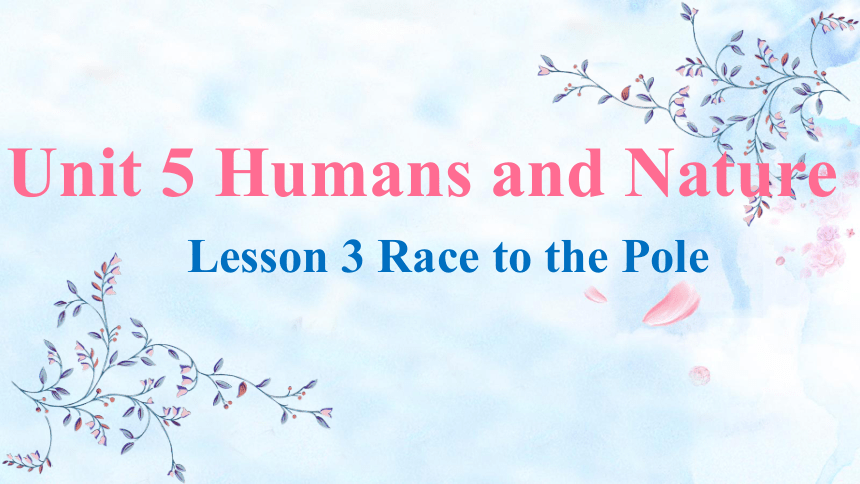
|
|
| 格式 | pptx | ||
| 文件大小 | 2.3MB | ||
| 资源类型 | 教案 | ||
| 版本资源 | 北师大版(2019) | ||
| 科目 | 英语 | ||
| 更新时间 | 2024-07-22 00:00:00 | ||
图片预览

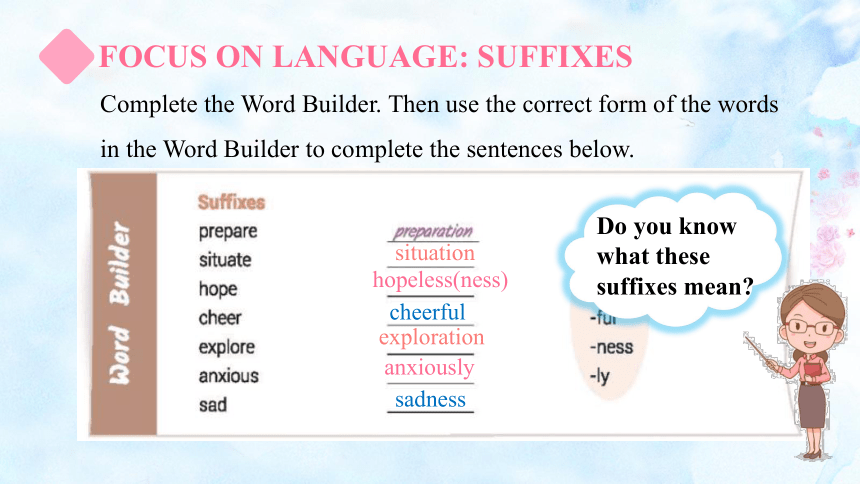
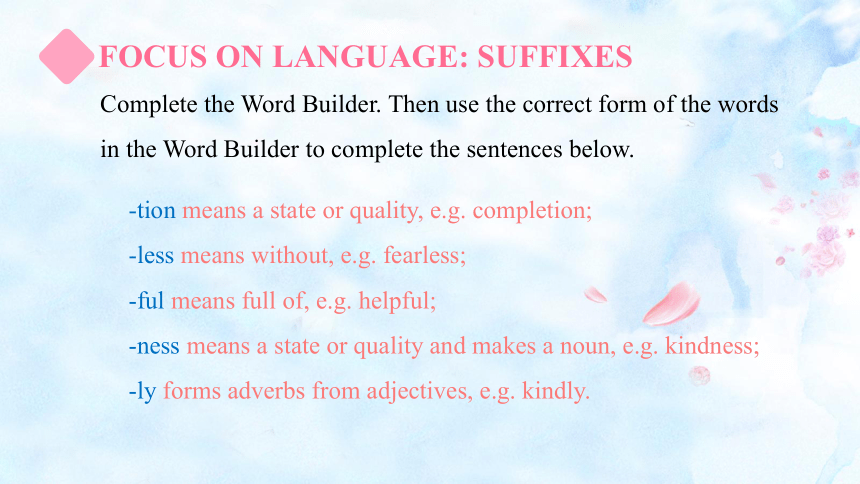
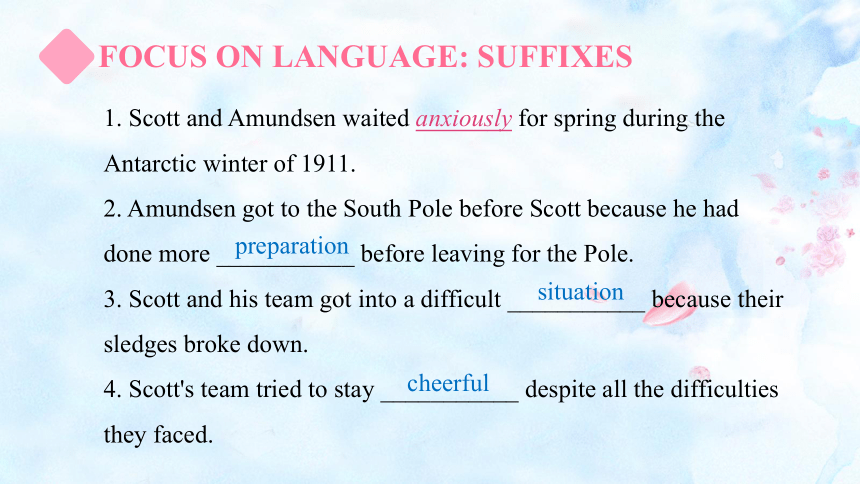
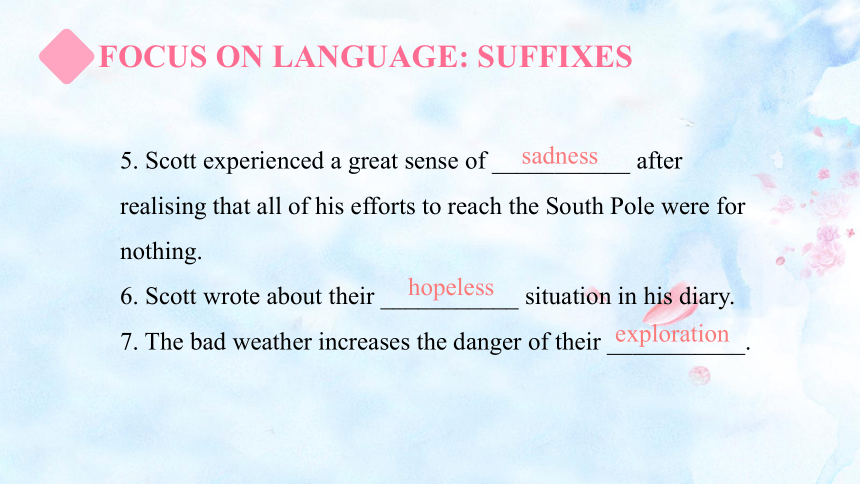

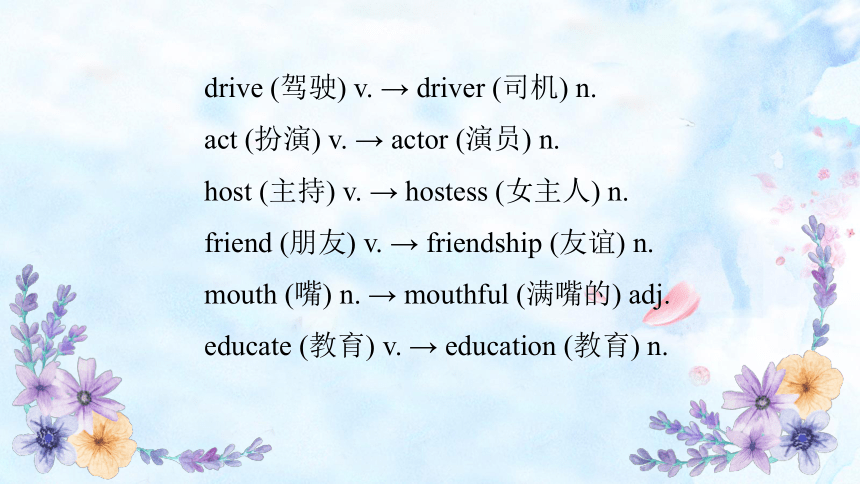
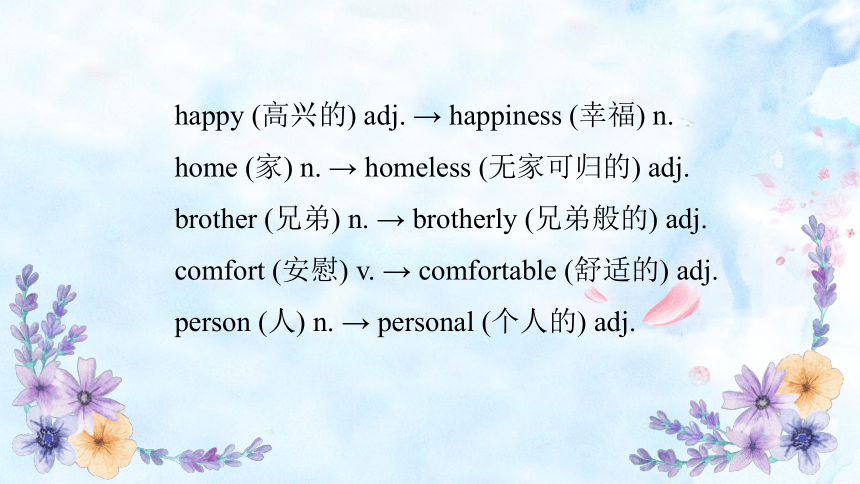
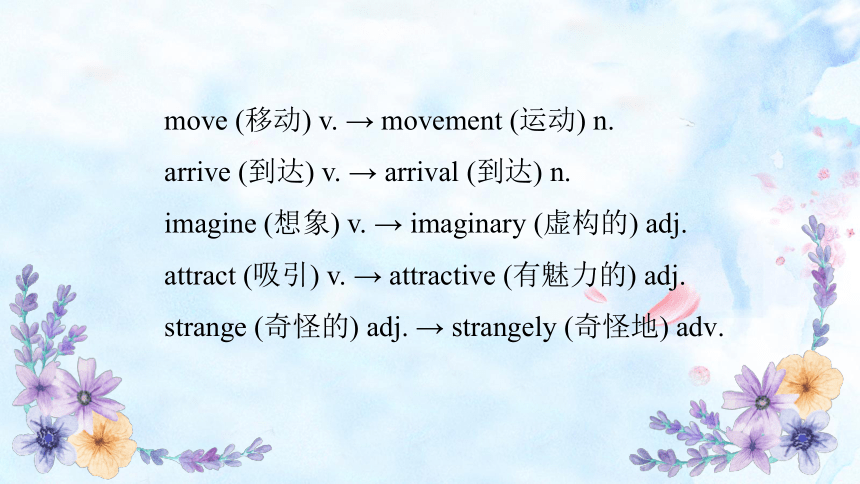
文档简介
(共27张PPT)
Lesson 3 Race to the Pole
Unit 5 Humans and Nature
FOCUS ON LANGUAGE: SUFFIXES
Complete the Word Builder. Then use the correct form of the words in the Word Builder to complete the sentences below.
situation
hopeless(ness)
cheerful
exploration
anxiously
sadness
Do you know what these suffixes mean
FOCUS ON LANGUAGE: SUFFIXES
Complete the Word Builder. Then use the correct form of the words in the Word Builder to complete the sentences below.
-tion means a state or quality, e.g. completion;
-less means without, e.g. fearless;
-ful means full of, e.g. helpful;
-ness means a state or quality and makes a noun, e.g. kindness;
-ly forms adverbs from adjectives, e.g. kindly.
FOCUS ON LANGUAGE: SUFFIXES
1. Scott and Amundsen waited anxiously for spring during the Antarctic winter of 1911.
2. Amundsen got to the South Pole before Scott because he had done more ___________ before leaving for the Pole.
3. Scott and his team got into a difficult ___________ because their sledges broke down.
4. Scott's team tried to stay ___________ despite all the difficulties they faced.
preparation
situation
cheerful
FOCUS ON LANGUAGE: SUFFIXES
5. Scott experienced a great sense of ___________ after realising that all of his efforts to reach the South Pole were for nothing.
6. Scott wrote about their ___________ situation in his diary.
7. The bad weather increases the danger of their ___________.
sadness
hopeless
exploration
语法:后缀
后缀是一种重要的构词法。它是一种后置于其他词素后的词缀,通过后缀常常可以判断一个词的词性。后缀可使一个词变为名词、动词、形容词等。
drive (驾驶) v. → driver (司机) n.
act (扮演) v. → actor (演员) n.
host (主持) v. → hostess (女主人) n.
friend (朋友) v. → friendship (友谊) n.
mouth (嘴) n. → mouthful (满嘴的) adj.
educate (教育) v. → education (教育) n.
happy (高兴的) adj. → happiness (幸福) n.
home (家) n. → homeless (无家可归的) adj.
brother (兄弟) n. → brotherly (兄弟般的) adj.
comfort (安慰) v. → comfortable (舒适的) adj.
person (人) n. → personal (个人的) adj.
move (移动) v. → movement (运动) n.
arrive (到达) v. → arrival (到达) n.
imagine (想象) v. → imaginary (虚构的) adj.
attract (吸引) v. → attractive (有魅力的) adj.
strange (奇怪的) adj. → strangely (奇怪地) adv.
1. 常见名词后缀
-ion/-tion/-ation/-sion, -ance, -er, -or, -ist, -ship, -ness, -(i)ty, -th, -ment, -hood, -ful, -ess, -ure, -al等。
agree → agreement (同意)
attract → attraction (有吸引力的事或人)
conclude → conclusion (结论)
compete → competition (竞争;比赛)
discuss → discussion (讨论)
organize → organization (组织)
appear → appearance (外貌;出现)
perform → performance (演出)
mean → meaning (意义)
say → saying (谚语)
press → pressure (压力)
fail → failure (失败)
decide → decision (决定)
create → creativity (创造力)
develop → development (发展)
enjoy → enjoyment (享受)
happy → happiness (幸福)
kind → kindness (善良)
act → actor (演员)
teach → teacher (老师)
free → freedom (自由)
bore → boredom (厌烦)
develop → development (发展)
2. 常见动词后缀
-en, -fy, -ise, -ate, -en, -fy, -ify, -ize, -ise等。
weak → weaken (使虚弱)
identity→ identify (识别)
real→ realize (意识到)
sharp→ sharpen (使锋利)
organ → organize (组织)
wide → widen (变宽)
long → length (加长)
short → shorten (缩短)
simple → simplify (简化)
beauty → beautify (美化)
apology → apologize (道歉)
3. 常见形容词后缀
-ful, -less, -ish, -ive, -ous, -able, -cal, -cial, -ing, -y, -ed, -an, -ese, -en, -ern, -ic, -ical, -some, -y等。
anger → angry (生气的)
health → healthy (健康的)
balance → balanced (平衡的)
gift → gifted (有天赋的)
care → careful/careless (小心的/ 粗心的)
use → useless/useful (无用的/ 有用的)
east → eastern (东方的)
change → changeable (易变的)
knowledge → knowledgeable (博学的)
danger → dangerous (危险的)
humor → humorous (幽默的)
confidence → confident (自信的)
difference → different (不同的)
class → classical (经典的)
nature → natural (自然的)
friend → friendly (友好的)
love → lovely (可爱的)
wood → wooden (木制的)
gold → golden (金色的)
chemistry → chemical (化学的)
physics → physical (身体的)
importance → important (重要的)
tire → tiresome (令人厌倦的)
harm → harmful/ harmless (有害的/ 无害的)
4. 常见副词后缀
-ly; 辅音字母y变-ily; -ward, -wards, -wise等。
correct → correctly (正确地)
quiet → quietly (安静地)
easy → easily (容易地)
healthy → healthily (健康地)
lucky → luckily (幸运地)
polite → politely (有礼貌地)
fortunate → fortunately (幸运地)
safe → safely (安全地)
west → westward (向西地)
clock → clockwise (顺时针地)
Practice
1. Jack doesn't want to buy a pair of gym shoes but to take ___________ (fit) classes.
2. The ________________ (relation) between the two speakers is classmates.
3. The man seldom does exercise because he lacks ______________ (motive).
4. All across the country, ___________ (recover) centers have begun building Healing Gardens.
fitness
relationship
motivations
recovery
Practice
5. The ad had a phone number for a town in ___________ (south) Michigan.
6. But then we got an ___________ (office) letter and we were blown away.
7. Most of us volunteers ___________ (breath) a sigh of relief when the season ends.
southern
official
breathe
Practice
8. It is difficult to figure out a ___________ (globe) population of polar bears.
9. Whether sick or fine, she is always ___________ (cheer).
10. The social environment is extremely influential when we're making ___________ (decide).
global
cheerful
decisions
Thank you
Lesson 3 Race to the Pole
Unit 5 Humans and Nature
FOCUS ON LANGUAGE: SUFFIXES
Complete the Word Builder. Then use the correct form of the words in the Word Builder to complete the sentences below.
situation
hopeless(ness)
cheerful
exploration
anxiously
sadness
Do you know what these suffixes mean
FOCUS ON LANGUAGE: SUFFIXES
Complete the Word Builder. Then use the correct form of the words in the Word Builder to complete the sentences below.
-tion means a state or quality, e.g. completion;
-less means without, e.g. fearless;
-ful means full of, e.g. helpful;
-ness means a state or quality and makes a noun, e.g. kindness;
-ly forms adverbs from adjectives, e.g. kindly.
FOCUS ON LANGUAGE: SUFFIXES
1. Scott and Amundsen waited anxiously for spring during the Antarctic winter of 1911.
2. Amundsen got to the South Pole before Scott because he had done more ___________ before leaving for the Pole.
3. Scott and his team got into a difficult ___________ because their sledges broke down.
4. Scott's team tried to stay ___________ despite all the difficulties they faced.
preparation
situation
cheerful
FOCUS ON LANGUAGE: SUFFIXES
5. Scott experienced a great sense of ___________ after realising that all of his efforts to reach the South Pole were for nothing.
6. Scott wrote about their ___________ situation in his diary.
7. The bad weather increases the danger of their ___________.
sadness
hopeless
exploration
语法:后缀
后缀是一种重要的构词法。它是一种后置于其他词素后的词缀,通过后缀常常可以判断一个词的词性。后缀可使一个词变为名词、动词、形容词等。
drive (驾驶) v. → driver (司机) n.
act (扮演) v. → actor (演员) n.
host (主持) v. → hostess (女主人) n.
friend (朋友) v. → friendship (友谊) n.
mouth (嘴) n. → mouthful (满嘴的) adj.
educate (教育) v. → education (教育) n.
happy (高兴的) adj. → happiness (幸福) n.
home (家) n. → homeless (无家可归的) adj.
brother (兄弟) n. → brotherly (兄弟般的) adj.
comfort (安慰) v. → comfortable (舒适的) adj.
person (人) n. → personal (个人的) adj.
move (移动) v. → movement (运动) n.
arrive (到达) v. → arrival (到达) n.
imagine (想象) v. → imaginary (虚构的) adj.
attract (吸引) v. → attractive (有魅力的) adj.
strange (奇怪的) adj. → strangely (奇怪地) adv.
1. 常见名词后缀
-ion/-tion/-ation/-sion, -ance, -er, -or, -ist, -ship, -ness, -(i)ty, -th, -ment, -hood, -ful, -ess, -ure, -al等。
agree → agreement (同意)
attract → attraction (有吸引力的事或人)
conclude → conclusion (结论)
compete → competition (竞争;比赛)
discuss → discussion (讨论)
organize → organization (组织)
appear → appearance (外貌;出现)
perform → performance (演出)
mean → meaning (意义)
say → saying (谚语)
press → pressure (压力)
fail → failure (失败)
decide → decision (决定)
create → creativity (创造力)
develop → development (发展)
enjoy → enjoyment (享受)
happy → happiness (幸福)
kind → kindness (善良)
act → actor (演员)
teach → teacher (老师)
free → freedom (自由)
bore → boredom (厌烦)
develop → development (发展)
2. 常见动词后缀
-en, -fy, -ise, -ate, -en, -fy, -ify, -ize, -ise等。
weak → weaken (使虚弱)
identity→ identify (识别)
real→ realize (意识到)
sharp→ sharpen (使锋利)
organ → organize (组织)
wide → widen (变宽)
long → length (加长)
short → shorten (缩短)
simple → simplify (简化)
beauty → beautify (美化)
apology → apologize (道歉)
3. 常见形容词后缀
-ful, -less, -ish, -ive, -ous, -able, -cal, -cial, -ing, -y, -ed, -an, -ese, -en, -ern, -ic, -ical, -some, -y等。
anger → angry (生气的)
health → healthy (健康的)
balance → balanced (平衡的)
gift → gifted (有天赋的)
care → careful/careless (小心的/ 粗心的)
use → useless/useful (无用的/ 有用的)
east → eastern (东方的)
change → changeable (易变的)
knowledge → knowledgeable (博学的)
danger → dangerous (危险的)
humor → humorous (幽默的)
confidence → confident (自信的)
difference → different (不同的)
class → classical (经典的)
nature → natural (自然的)
friend → friendly (友好的)
love → lovely (可爱的)
wood → wooden (木制的)
gold → golden (金色的)
chemistry → chemical (化学的)
physics → physical (身体的)
importance → important (重要的)
tire → tiresome (令人厌倦的)
harm → harmful/ harmless (有害的/ 无害的)
4. 常见副词后缀
-ly; 辅音字母y变-ily; -ward, -wards, -wise等。
correct → correctly (正确地)
quiet → quietly (安静地)
easy → easily (容易地)
healthy → healthily (健康地)
lucky → luckily (幸运地)
polite → politely (有礼貌地)
fortunate → fortunately (幸运地)
safe → safely (安全地)
west → westward (向西地)
clock → clockwise (顺时针地)
Practice
1. Jack doesn't want to buy a pair of gym shoes but to take ___________ (fit) classes.
2. The ________________ (relation) between the two speakers is classmates.
3. The man seldom does exercise because he lacks ______________ (motive).
4. All across the country, ___________ (recover) centers have begun building Healing Gardens.
fitness
relationship
motivations
recovery
Practice
5. The ad had a phone number for a town in ___________ (south) Michigan.
6. But then we got an ___________ (office) letter and we were blown away.
7. Most of us volunteers ___________ (breath) a sigh of relief when the season ends.
southern
official
breathe
Practice
8. It is difficult to figure out a ___________ (globe) population of polar bears.
9. Whether sick or fine, she is always ___________ (cheer).
10. The social environment is extremely influential when we're making ___________ (decide).
global
cheerful
decisions
Thank you
同课章节目录
- Unit 4 Information technology
- Lesson 1 Avatars
- Lesson 2 Apps
- Lesson 3 Internet and Friendships
- Unit 5 Humans and nature
- Lesson 1 A Sea Story
- Lesson 2 Professional Rescue Team
- Lesson 3 Race to the Pole
- Unit 6 The admirable
- Lesson 1 A Medical Pioneer
- Lesson 2 History Makers
- Lesson 3 The Superhero Behind Superman
